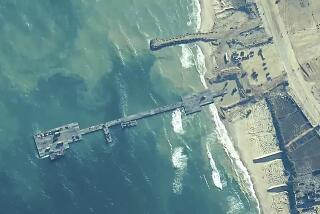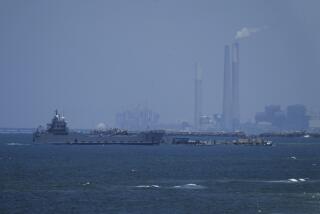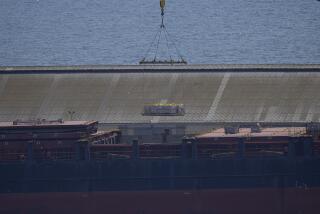Near Somalia, No Last-Minute Case of Nerves
- Share via
This U.S. Navy ship, carrying enough supplies and ammunition to arm, feed and quench the thirst of 2,000 Marines during 15 days of battle, is steaming toward a midnight rendezvous tonight with a U.S. flotilla--and, soon after, the beginning of Operation Restore Hope in Somalia.
Lt. Col. Tom Zink, who will head a 300-person contingent to run the port in Somalia’s capital, Mogadishu, shared the almost cocky assuredness of most Marine and Navy officers and soldiers preparing for the mission to guard relief supplies and food-distribution networks in that famine-plagued nation.
“I was worried going into Saudi Arabia during (Persian Gulf Operation) Desert Storm,” said Zink, with the Coronado (Calif.) Naval Amphibious Base. “When they told us there were 300 Iraqi tanks 90 miles away, I was worried.
“Here, they’re telling us there are a bunch of 12-year-olds with AK-47s who will shoot you for your socks in Somalia,” he added. “Nobody’s taking it lightly. But they don’t worry us.”
Military officials say the Marines will first take the port and the beachfront airport in Mogadishu, setting up a base headquarters in the city. Then, within days, they will seize the airport in Baidoa, a town about 160 miles northwest of Mogadishu set amid some of the worst suffering of the famine. Once Baidoa is secured, the Army’s 10th Mountain Division Light, a light infantry unit, will arrive to secure roads out to relief agency feeding areas and between Baidoa and the capital.
The military’s humanitarian mission, along with announcements by Somalia’s two chief warlords that they welcome the operation, has raised hopes among Marines here and relief officials in Mogadishu that there will be a minimum of bloodshed.
“Everything I hear is that we’re going to be welcomed there,” said Marine Col. Fred Peck, spokesman for the Joint Military Task Force. Comparing it to the military operation to quell violence in South-Central Los Angeles earlier this year, Peck said: “In South-Central, we didn’t know the players. But here we know all the players, all the warring parties.”
The Lt. Lummus, a motor vessel the size of two city blocks, set sail Sunday at dusk from Mombasa, Kenya, carrying M-1 tanks, Humvees, amphibious assault vehicles, mobile desalination plants and thousands of other items to help launch the U.S.-led mission.
The operation will begin with a landing by 1,800 Marines from the Camp Pendleton-based 15th Marine Expeditionary Unit now waiting aboard the Tripoli and two other amphibious ships in international waters off the coast of Somalia on Africa’s eastern flank.
More than 28,000 troops from the United States and elsewhere will be deployed eventually, the Pentagon has said, with many arriving by air after the Marines have secured Mogadishu’s airport. And an aircraft carrier, the Ranger, with 5,000 soldiers aboard, also is steaming for the region.
The first unit of Marines will enter a chaotic country, probably by both air and sea, to work at restoring order and putting an end to the ceaseless looting of relief food shipments. Like Operation Desert Storm, this operation is under U.S. command but will be joined by soldiers from at least 12 other countries.
Somalia has seen an estimated 300,000 starvation deaths in the past year; 1,000 die every day of hunger, and an additional 2.5 million are at risk, relief officials say. The country has no functioning government, and hundreds of thousands of youth and men, only loosely controlled by squabbling warlords, rule the streets and have been boldly stealing up to 90% of the imported food--often within minutes of its arrival at ports and airstrips.
Relief officials have been frustrated by the looting, which has backed up shipments of food to the country. But they also worry that the tense situation could deteriorate rapidly if the joint military effort appears to take sides in the conflict--or to take guns out of people’s hands.
“If you try to take away their guns, or try to set up a government in Somalia, you’ll have another Beirut,” said Sam Toussier, director of operations for the U.S.-based International Medical Corps, a relief agency operating in Somalia.
On the other hand, he said that “Somalis respect force and they have contempt for weakness. The Marines will need not just adequate force but an ostentatious show of force.”
That is just what is planned. Operation Restore Hope is being run by Marine Lt. Gen. Robert P. Johnston from Camp Pendleton.
The Marine unit aboard the Tripoli, Rushmore and Juneau, diverted from exercises in the Persian Gulf, has been involved in other humanitarian missions. It was sent to Bangladesh to assist in a relief effort after a devastating typhoon and to the Philippines after Mt. Pinatubo erupted. It also was among the first units deployed in the Persian Gulf War.
More to Read
Sign up for Essential California
The most important California stories and recommendations in your inbox every morning.
You may occasionally receive promotional content from the Los Angeles Times.











